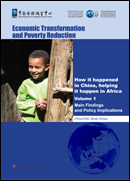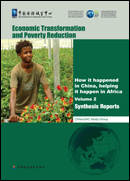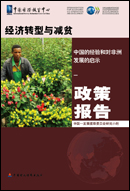Development Co-operation Directorate (DCD-DAC)
The China-DAC Study Group
The China-DAC Study Group was formed in 2009 to share knowledge and exchange experiences on promoting growth and reducing poverty in developing countries, including how international assistance can be effective in supporting this objective. Facilitating mutual learning on poverty reduction is the Study Group’s key principle.
Frequently asked questions
- What are the Study Group's current objectives?
- How is the Study Group pursuing those objectives?
- What are the Study Group's expected outcomes?
- Who participates in the Study Group?
- How does the Study Group operate?
- How is the Study Group funded?
- What has the Study Group done in the past?
What are the Study Group’s current objectives?
The China-DAC Study Group facilitates mutual learning between China and DAC members/observers on how to deliver quality aid to support more effective development and poverty reduction in developing countries.
Improving the quality of foreign assistance is an objective for both China and the DAC. As highlighted in its 2014 White Paper on Foreign Aid, China is working actively to optimise the country’s foreign aid structure and improve the quality of its foreign aid. As part of its mandate, the DAC seeks to enhance the quality and effectiveness of development assistance, particularly regarding pro-poor economic growth and poverty reduction.
How is the Study Group pursuing those objectives?
In its activities, the China-DAC Study Group will bring together national and international officials, experts, private sector and civil society participants on a flexible basis to generate mutual learning on topics of common interest, thereby helping to inform policy making. The Study Group will be demand-driven, responding to expressed interests. The focus will remain predominantly on Africa but there is an opening to include Asia and the Pacific in this new phase of work.
The Study Group will pursue its objectives through activities at two levels:
Roundtables
Since 2011, the China-DAC Study Group’s main modality has changed from large format thematic conferences to a limited number of action-oriented Roundtables. The Roundtables are flexible in terms of subjects, modalities and participants. The Roundtables may be organised on a one-off basis or as part of a series on a specific topic.
- "Effective Development Co-operation: Drawing lessons from agricultural development in Africa", held in Beijing on 18 June 2013 (Agenda, pdf, 136 kb), which drew on the findings from joint study visits the Study Group organised to
- Tanzania - see report in English (pdf, 941 kb) / in Chinese (pdf, 804 kb)
- Zimbabwe - see report in English (pdf, 704 kb) / in Chinese (pdf, 801 kb)
- Key messages and main conclusions from the discussions: Towards more effective development co-operation: Africa, China and DAC members sharing lessons learnt (pdf, 240 kb)
- "Evaluating Development Co-operation: Providing Evidence for Learning and Decision Making", held in Beijing on 12 June 2014 (Agenda, pdf, 244 kb), which drew on the findings from Chinese representatives observing evaluations conducted by the French Development Agency (AfD) and the United States Agency for International Development (USAID)
- Key messages and main conclusions from the discussions: Evaluating Development Co-operation: Providing evidence for learning and decision making - What are the implications for China? (pdf, 559 Kb) / in Chinese (pdf, 727 kb)
Policy Symposia
Following up on the Policy Symposium that took place in Beijing on 8 June 2011 (see below), further Policy Symposia, involving officials from key ministries and agencies from China, Africa and OECD countries, may be held from time to time to share broad perspectives on topical issues.
- Summary of event on Promoting ethical business and public-private partnership for development (pdf) held in Beijing on 14 November 2014. Agenda (pdf, 151 Kb).
What are the Study Group’s expected outcomes?
By learning together and from each others’ experiences and practices, China and DAC members will increase their mutual understanding and trust. This will provide a basis for policy dialogue and for exploring how China and DAC members can work more closely together in the future.
Who participates in the Study Group?
The China-DAC Study Group comprises experts from China and DAC members/observers with detailed knowledge and operational experience of DAC donor support as well as of China’s aid to foreign countries. Study Group members contribute actively and substantially to implementing the Study Group’s agreed work programme. The Study Group also seeks to involve African institutions in its activities, building on the extensive participation by Africans in activities to date.
How does the Study Group operate?
The China-DAC Study Group operates on an informal basis,setting up structures and assigning responsibilities in ways that will enable the Study Group to implement its agreed work programme. The International Poverty Reduction Centre in China (IPRCC) and the OECD's Development Assistance Committee (DAC) form the joint secretariat of the Study Group and provide its co-chairs.
Each Roundtable will be organised by a core group of Study Group members ready to lead, contribute actively to their preparation and fund them, in association with other key stakeholders invited to participate on an ad hoc basis.
How is the Study Group funded?
The China-DAC Study Group is self-funded on a cost-sharing basis. It is expected that the Study Group members will mobilise the necessary in-kind resources and financing required to implement the Study Group’s agreed work programme.
What has the Study Group done in the past?
During 2009-11, the Study Group organised four major international events on important topics related to promoting growth and reducing poverty:
- Development partnerships (in Beijing on 28-29 October 2009). See Summary of discussions (pdf, 911 kb)
- Agriculture, food security and rural development (in Bamako on 27-28 April 2010). See Summary of discussions (pdf, 812 kb)
Further work on agriculture by the DAC; Poverty Reduction Network (POVNET) Policy statement and Agriculture executive summary in Chinese (pdf, 686 kb)
- Infrastructure (in Beijing on 19-20 September 2010). See Summary of discussions (pdf, 924 kb)
Further work on infrastructure by the DAC; POVNET Policy statement and Infrastructure executive summary in Chinese (pdf, 657 kb)
- Enabling environment for enterprise development (in Addis Ababa on 16-17 February 2011). Summary of discussions (pdf, 762 kb)
Further work on private sector development by the DAC; POVNET Policy statement and overview of private sector development in Chinese (pdf, 770 kb)
These events focused on China’s recent development experience and on how economic transformation and poverty reduction can be promoted in Africa. The main lessons (pdf, 895 kb) distilled from these events were presented and discussed at a Policy Symposium in Beijing on 8 June 2011 and have been published in a two-volume report "Economic Transformation and Poverty Reduction. How it happened in China, helping it happen in Africa".
 |
|
|
Volume 1 - Main findings and policy implications (pdf, 3.27 MB) |
Volume 2 - Synthesis reports (pdf, 3.69 MB) |
|
Volume1 Main findings and policy implications - Chinese version (pdf, 2.10 MB) |
The main lessons drawn from the Study Group’s first phase of work were disseminated during 2011-12, including at the 4th High-Level Forum on Aid Effectiveness in Busan, Korea, and at a seminar at the London School of Economics and Political Science.
Related Documents

